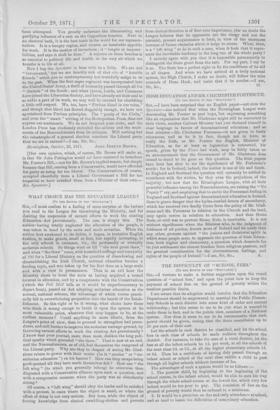WHAT CHOICE HAS THE EDUCATION LEAGUE ?
[TO THE EDITOR OF THE "SPECTITOR.1
Sin, —I must confess to a feeling of some surprise at the lecture you read to the League for threatening the Ministry, and for desiring the suspension of earnest efforts to work the existing Education Act provisionally. The case is simply this. The nation• having totally neglected the education of the people, it was taken in hand by the sects and made sectarian. When the 'nation first awakened to its duties, it began, in tentative English 'fashion, to make grants, small at first, but rapidly increasing, to the only schools in existence, viz., the professedly or virtually sectarian schools. So things went on till " the next groat thaw," and when "the thaw" came, with household suffrage and a majority -of 100 for a Liberal Ministry on the question of disendowing and .disestablishing the Irish Church, national education became a (leading topic, and was taken up for the first time on a large scale and with a view to permanence. Then in an evil hour the Ministry chose to treat the sects as having acquired a vested interest in education, and by a compromise with the Conservatives (which the Pall Hall tells us it would be unparliamentary to depart from), passed an Act adopting sectarian education as the normal, national scheme, the advantage of which course practi- cally fell in overwhelming proportion into the hands of the Estab- lishment. Be this right or be it wrong, what choice have those who think it wrong except to break in upon the system at its most vulnerable point, whatever that may happen to be, at the -.earliest moment? Could anything be more idiotic, from the League's point of view, than to proceed to strengthen bad prece- dents, and still further to improve the sectarian vantage-ground, by favouring earnest efforts to work the existing Act provisionally ? Z know that your journal, more than most, dislikes the long poli- tical apathy which preceded " the thaw." That is now at an end, and the Nonconformists, as of old, feel themselves the vanguard of the Liberal party. Why are they to despair of seeing Mr. Glad- stone return to power with their motto (be it " secular " or " un- sectarian education ") on his banner ? How can they escape being pooh-poohed till they have made themselves felt ? How can " the left wing " (to which you generally belong) be otherwise than disgusted with a Conservative alliance upon such a question, and with a compromise measure when the party was so abundantly strong?
Of course, a "left wing" should obey the leader and be satisfied with a protest, in cases where the object is small, or where the effect of delay is not very serious. But here, while the object of freeing knowledge from clerical swaddling-clothes and parents
from clerical dictation is of first-rate importance, (for no doubt the League believes that its opponents are the clergy and not the parents), present acquiescence is fatal, in view of the enormous increase of future obstacles which it helps to create. What, then, is a " left -wing " to do in such a ease, when it feels that it repre- sents the inevitable tendency in the long run of the whole party ?
I entirely agree with you that it is impossible permanently to distinguish the State grant from the rate. For my part, I say be it so. The State has a perfect right to fix the conditions of its aid in all shapes. And when we have arrived at a truly national system, the High Church, I make no doubt, will follow the wise counsels of Dean Hook, and insist that it be secular.—I am,


































 Previous page
Previous page